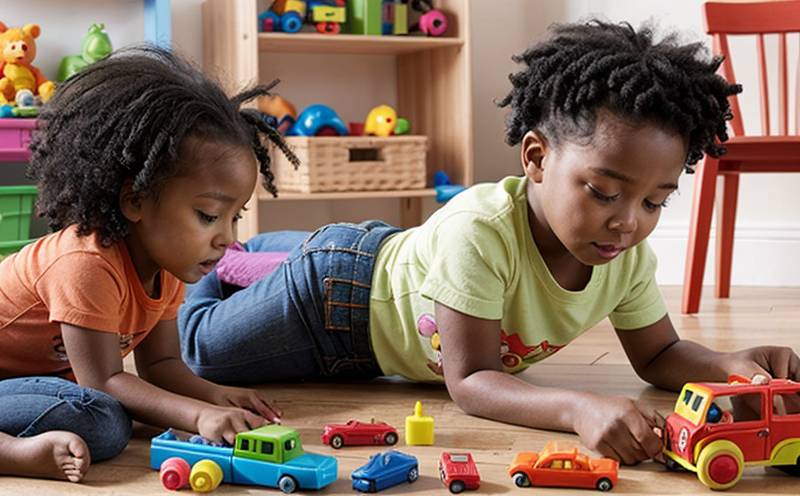Bottle Nipple Safety Testing
The safety of bottle nipples is a critical concern in the consumer products and product safety testing sector. Bottle nipples are not just functional components; they play a pivotal role in ensuring child health and well-being, especially for infants and toddlers. Ensuring that these small parts meet stringent safety standards is crucial to prevent choking hazards, ingestion risks, and other potential injuries.
The primary purpose of bottle nipple safety testing involves several key parameters aimed at identifying potential dangers such as sharp edges, small parts, and flammability issues. These tests are conducted in compliance with international standards like ASTM F963, which sets comprehensive guidelines for toy safety, including specific requirements for baby products.
During the testing process, bottle nipples undergo rigorous examination to ensure they do not contain harmful chemicals such as lead or phthalates. This is achieved through a series of tests that include:
- Flammability Testing
- Choking Hazard Assessments
- Material Compatibility Tests
- Durability and Stability Checks
- Chemical Composition Analysis
The testing process begins with a detailed review of the product’s design to identify potential risks. This is followed by physical tests that simulate real-world use scenarios, ensuring the bottle nipple withstands typical stress without compromising its integrity or safety.
One of the most critical aspects of this testing involves identifying small parts and ensuring they adhere to the small parts regulation (SPR) guidelines specified in ASTM F963. This ensures that any components smaller than 11.8 mm, including bottle nipples, are designed with a choke-protection mechanism or are securely attached.
The durability of the bottle nipple is tested by simulating prolonged use and potential impacts. Instruments such as tensile testers and impact testers help in assessing how the nipple behaves under stress conditions that mimic everyday use. This ensures that even after repeated usage, the nipple remains safe for infants to use.
Chemical composition analysis plays a vital role in ensuring that bottle nipples are free from harmful substances. Using advanced spectrometry and chromatography techniques, our experts analyze the materials used in the manufacturing process. Compliance with standards like EN 71-3 for toys and child care articles is a key focus area here.
Our comprehensive testing also includes flammability tests to ensure that bottle nipples do not pose fire hazards under any conditions. This is particularly important given their proximity to the mouth of infants, where they might be exposed to heat sources or open flames during use.
The final step in this process involves a detailed inspection and certification by our accredited laboratories. Our team ensures that all tests are conducted with precision and accuracy, adhering strictly to international standards. The result is a certificate that not only certifies compliance but also provides valuable insights into areas where the product can be improved.
By focusing on these critical parameters, we ensure that every bottle nipple tested meets the highest safety standards, thereby contributing significantly to infant and toddler health and well-being. Our approach ensures that products meet regulatory requirements while providing additional layers of protection against potential hazards.
Benefits
The benefits of bottle nipple safety testing extend beyond mere compliance; they contribute significantly to the overall quality and reputation of consumer goods. By ensuring that every bottle nipple meets stringent safety standards, manufacturers can:
- Avoid costly recalls and legal issues
- Enhance brand reputation through consistent product reliability
- Increase customer trust by demonstrating a commitment to child safety
- Prolong the shelf life of products by ensuring durability against common wear and tear
- Avoid potential health risks associated with unsafe bottle nipples
Our testing services not only help in meeting regulatory requirements but also provide valuable insights that can drive product innovation. By identifying areas for improvement early on, manufacturers can enhance the design and functionality of their products, leading to better consumer satisfaction.
Eurolab Advantages
At Eurolab, we pride ourselves on offering world-class testing services that are second to none. Our advantages lie in our extensive experience and expertise in the field of safety testing for consumer products, particularly toys and children’s products.
- Comprehensive Testing Capabilities: We offer a full suite of testing services tailored to meet all relevant international standards. This ensures that our clients are fully compliant with global regulations.
- Accredited Laboratories: Our labs are accredited by leading accrediting bodies, ensuring the highest level of accuracy and reliability in our test results.
- State-of-the-Art Equipment: We use cutting-edge technology to conduct our tests, providing precise and accurate data that can be relied upon for decision-making.
- Experienced Experts: Our team comprises highly skilled professionals with deep knowledge in the field of consumer product safety. They bring a wealth of experience that ensures thorough testing.
- Comprehensive Reporting: We provide detailed and actionable reports that not only outline compliance but also highlight potential areas for improvement, facilitating informed decision-making.
Environmental and Sustainability Contributions
In addition to ensuring product safety, Eurolab is committed to contributing positively to the environment. Our testing services play a crucial role in promoting sustainable practices by:
- Promoting Safe Use of Resources: By identifying and eliminating harmful chemicals, we help manufacturers use resources more efficiently without compromising product quality.
- Supporting Recycling Initiatives: Through our testing services, we assist in the development of products that are easier to recycle or dispose of safely at the end of their lifecycle.
- Educating on Sustainable Materials: Our expertise extends to advising manufacturers on the use of sustainable materials and processes, reducing environmental impact throughout the product lifecycle.





